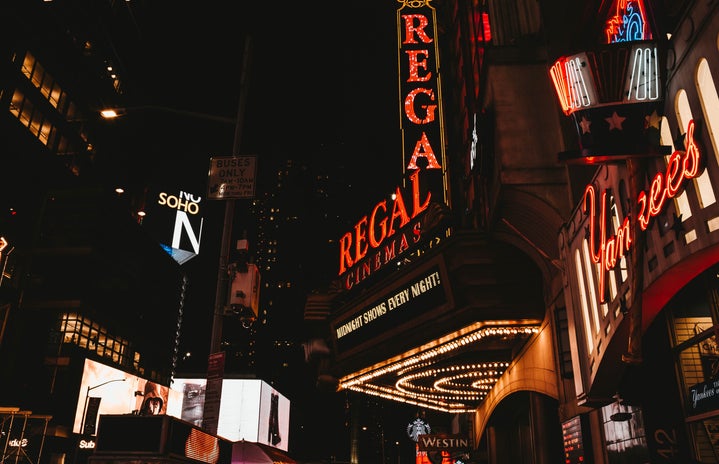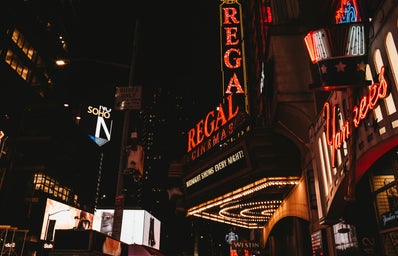Movie theatres are far from obsolete, but I’ve recently noticed a lack of motivation and inclination to take a trip to the cinema from myself and others. Naturally, big pictures with lots of buzz tend to draw people out, such as the Barbie/Oppenheimer duo in the summer, Top Gun, and a few select Oscar nominees. However, during the rest of the year – with its smaller or perhaps less topical pictures – theatres tend to ring silent. A friend living in Paris recently recounted a typical weekend and named outings to the cinema as one of her frequent activities. She is apparently not an anomaly; regular movie-seeing is part of Parisian culture. Although I can’t speak for all of London, it doesn’t seem that the city has a similar tendency. Two contributing factors to the difference – at least for myself – are the city’s size and often extortionate prices. The only theatre I can walk to from my flat boasts tickets from upwards of fifteen pounds, meaning that a thirty-minute journey must accompany my ventures, in which I will still have to spend at least ten. The increase of streaming services has also impacted the decline of theatres all over; their easy access creating no need to spend additional money or leave the comfort of the couch. Research by KCMG shows Disney+’s numbers increasing substantially over the past few years, constantly surpassing their yearly subscription targets. Many movies are now foregoing the theatre completely, instead opting for immediate release on Netflix or Amazon. If not, rentals are always available, as is the even more available illegal streaming.
The effects of COVID are still prominent for both cinemas and movie-goers, as they forced an acclimatisation to spending more time at home. However, whether these changes are permanent is uncertain. Henry Moore, writing for SELondoner, projects hope, claiming “admissions are up, more so than many expected, with numbers rising both nationally, to 177 million, and in the city, to 26.9 million, according to the BFI”. The British Film Institute’s stats show that 2022 saw 117 million ticket sales compared to 176 million in 2019. The big releases of the past year seem to have reminded people of the good of cinema. Philip Clapp, chief executive of the UK Cinema Association, is also optimistic, believing that numbers will eventually rise to what they were pre-COVID. Conversely, The Financial Times stipulates that recovery is happening, albeit slowly, yet doesn’t think that movie-going will ever be the same.
Values concerning theatre are certainly evolving. Whitten at the CNBC explains the shift away from large yet simple venues to ones of higher quality. Premium options are increasingly popular, offering a more luxurious experience at a slightly higher price. The seats are twice the size, sometimes including cushions and blankets, and always reclining. The food doesn’t only consist of stale popcorn but a selection of savoury meals, sweet treats, and even cocktails, which don’t require a wait in line as they’ll be delivered directly to your seat. Everything except the movie is used to entice people to leave their homes, to receive an additional benefit that can’t be achieved by staying in bed. Clapp also predicts a rise in smaller, independent cinemas, such as with now ubiquitous independent entertainment company A24. Uniqueness and quality are trending, both attributes with which younger generations tend to associate worth.
Yet, even without all the new thrills and perks of the theatre, I believe that seeing movies in the cinema is still important. Although everyone watches movies to escape, escapism is heightened when watching in a theatre. You’re forced to watch without breaks or distractions from people and phones. You can fully engage and concentrate – acts often difficult to perfect at home. Watching films surrounded by others also adds to the experience, creating community in unified laughs, cries, and gasps. Other than at concerts and plays, there aren’t many opportunities to experience art in such a way. While not all movies are or aim to be artistic creations, many do, and are therefore harder to appreciate when watching on smaller devices. Theatre screens are equipped to showcase the visual and auditory aspects of a film in its most ideal format. Sound and picture are grandeur, more detailed, more vivid, and thus more impactful. The universal presentation in cinemas means no distortion of colour, brightness, sound, size, or by notifications. So, although movie numbers are lower than before COVID and London’s prices and size can impede the ease of movie watching, cinemas are still likely to stay open and attract a crowd. Evolution and change in theatres should be embraced as long as they remind us to appreciate the fun and importance of movies.


